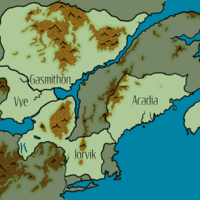Acadia

The Treaty of Still Waters recognizes Acadia as a single entity headed by an elected council. However, the nation is made up of four monarchies, each of which still considers itself a sovereign power in regards to the others and the other signatories of the treaty. Meanwhile their populace gives fealty and earnest worship to the House of Ellis and their merchants court the chairs of the treaty's council. Jorvik's politicians scheme and conspire endlessly. Gasmithon's clans stake claims of blood reaching back to forgotten times. Only Acadia melds uncertainty and ancestry with zealotry to create a truly Byzantine environment.
Anicipane is the southernmost realm, through which most trade passes. Along the coast lies Harbor, known for its fishermen and metalworkers. Embden pushes up into the mountains on the west, bordered by Harbor to the east, and is known for its shepherds and farmers. Then, to the east, is the island nation of Charlotte, rough heir to the few tattered ships that ply the ocean still.
An Acadian wedding takes place at and around the couple's to-be home. Each brings a chime that was forged at their birth, the priest gifts them a clapper, and their friends and neighbors give a crucifix. During the ceremony the priest works these together into a wind chime, and after the vows are spoken and it is hung on the house, they are wed - a strong wind is considered a blessing .
Whenever a child is born and survives a week, two chimes are crafted. One is added to the family's chime - the other is packed away for a future wedding. What casts a child's' chime is widely beloved to determine their walk in life: Reeds denote an artisan: shells, a wanderer; bronze, an artist; bones, a healer; and so on. A quiet night's sea-breeze gently rustles generations of Acadians to song.
Follow Vis Major's board Acadia on Pinterest.
Daily Life
Acadians eat of the sea much more than other nations, being one of the few groups of people who get most of their protein from animals instead of beans. Their evening meals tend to be savory affairs - a large, fresh fish or rich stew complimented with potted, earthy vegetables and buttered rolls. During the day most snack according to their appetite on cheese, shellfish, grapes, and bread instead of taking a sitting meal.
In the chill, windy mornings, Acadians favor coffee with greater zeal than elsewhere. Wine is the common drink of Acadia, but on non-festival days it is commonly taken watered to avoid intoxication. They produce a great variety of skillful vintages, many of which they export to Jorvik. Brandy is distilled for the sole benefit of cold-water fishing excursions, and hard alcohol under other circumstances is taboo.
Men have a preference for fleecy turtlenecked sweaters and wool breeches. Women tend towards long wool dresses. Both favor scarves, high boots, and broad-brimmed leather hats. Sea-going men also wear long oilcloth coats with leather shoulder capes. Dyes are not common, so most clothes are natural tans, browns, and creams. For special occasions, however, clean-cut and dark-dyed outfits are produced and accented with modest pearl and glass jewels.
Acadia's churches double as schools every Saturday. Nobody is required to attend but in most parishes parents whose children do not make a showing at least once a month can expect a concerned visit from the clergy.
